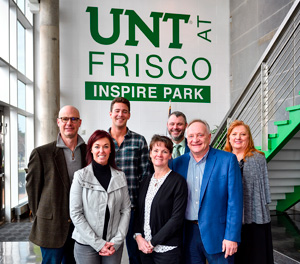|
|
|
|
 LaCore Labs' $1 million gift establishes research innovation center at UNT LaCore Labs' $1 million gift establishes research innovation center at UNT
A new collaboration between LaCore Labs and UNT includes a $1 million gift eligible for matching funds from the Texas Research Incentive Program, a new laboratory; sponsored research; a license to UNT technology; and real-world opportunities for students. In a first-of-its-kind collaboration for the university, LaCore Labs will establish an innovation center at UNT. The five-year agreement will equip an analytical research chemistry laboratory at UNT's Inspire Park in Frisco. LaCore signed a lease and converted space to wet labs, an investment exceeding $600,000.
|
|
|
|
|
|
| Testing potential COVID-19 drugs |
UNT professor and computational chemist G. Andrés Cisneros, along with his research group, are investigating inhibitor mechanisms of existing drugs to provide insights that could serve to improve treatment options for COVID-19. The team is running computer simulations using four U.S. supercomputers, including the world's most powerful, Summit, at the Oak Ridge National Laboratory in Tennessee.
|
|
|
|
|
|
|
| Creating 3D-printed ventilator splitters for COVID-19 patients |
|
In response to the possible need for more ventilators to treat critically ill COVID-19 patients, a team from UNT's College of Engineering collaborated to adapt a design and manufacture ventilator splitters in the college's digital manufacturing lab. The team used 3D printing technology to make the splitters, which will allow doctors to use a single ventilator to treat two patients.
|
|
|
|
|
|
|
| Goldwater Scholars |
|
Kevin Yao and Christopher Zhou, students from UNT's Texas Academy of Mathematics and Science, have been named 2020 Goldwater Scholars, one of the country's most prestigious scholarships awarded to students planning careers in mathematics, science or engineering. UNT leads Texas universities in the number of Goldwater scholars, with a total of 66 named since 1996. Learn more about Yao (left) and Zhou, who were nominated for awards based on the strength of the research they conducted during the two years they spent at UNT.
|
|
|
|
|
|
|
| College of Engineering professors receive fellowships |
|
Three College of Engineering faculty members recently have received recognition for their significant contributions to their research fields. Jincheng Du, a professor in the Department of Materials Science and Engineering, has been named a fellow of the American Ceramic Society, Sheldon Shi, a professor in the Department of Mechanical and Energy Engineering, was named a fellow by the International Society of Wood Science and Technology, and Thomas Scharf, a professor in the Department of Materials Science and Engineering, was elected a fellow of ASM International, the world's largest and most established materials information society.
|
|
|
|
|
|
|
| Transforming methane to methanol |
|
Large-scale, inexpensive conversion of methane gas into liquid methanol is like turning lead into gold, says Regents Professor of chemistry Tom Cundari. Methane, the primary component of abundant natural gas, can be converted to methanol, for use as fuel or conversion into gasoline. But it is expensive. Cundari and Texas Woman's University professor Mary Anderson have developed a breakthrough method they believe is the first step toward making the process feasible and attractive to industry.
|
|
|
|
|
|
|
| Validating citizen science |
|
From tracking the amount of rain in their backyards to monitoring the water quality in local streams, citizen scientists have collected data for as long as there has been curiosity. Kelly Albus, now a research scientist with UNT's Advanced Environmental Research Institute, spent four years as a Ph.D. student sifting through decades of data collected by citizen science groups and comparing it to that collected by professional agencies. And, it turns out from her research project, their data can be just as valid as that collected by professionals.
|
|
|
|
|
|